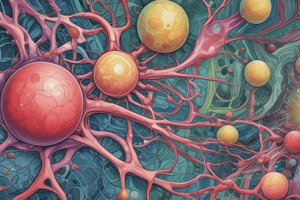Podcast
Questions and Answers
What does genetics primarily focus on in biology?
What does genetics primarily focus on in biology?
- Cell structure
- Human anatomy
- Inheritance patterns and genetic disorders (correct)
- Ecosystems
What is the main concept underlying evolution?
What is the main concept underlying evolution?
- Human anatomy
- Ecosystems
- Changes in the genetic composition of species over generations (correct)
- Cell structure
Which area of study helps deepen our understanding of adaptive responses to environmental shifts?
Which area of study helps deepen our understanding of adaptive responses to environmental shifts?
- Ecosystems (correct)
- Cell structure
- Human anatomy
- Genetics
What skill is essential in genetics and evolutionary theory?
What skill is essential in genetics and evolutionary theory?
Why is utilizing reliable resources important in biology studies?
Why is utilizing reliable resources important in biology studies?
What serves as the foundation for all biological systems?
What serves as the foundation for all biological systems?
Which of the following is a major component of human anatomy?
Which of the following is a major component of human anatomy?
What do ecosystems primarily comprise?
What do ecosystems primarily comprise?
Which of the following defines individual traits and hereditability within organisms?
Which of the following defines individual traits and hereditability within organisms?
What contributes uniquely to our appreciation of living organisms and how they interact with our planet?
What contributes uniquely to our appreciation of living organisms and how they interact with our planet?
Which structure provides insights into basic functions such as maintaining homeostasis and energy production?
Which structure provides insights into basic functions such as maintaining homeostasis and energy production?
Study Notes
Diving Into Biology: An Exploration of Cell Structure, Human Anatomy, Ecosystems, Genetics, and Evolution
Biology enriches our understanding of the natural world through its diverse subfields. We'll delve into five fundamental areas—cell structure, human anatomy, ecosystems, genetics, and evolution—each contributing uniquely to our appreciation of living organisms and how they interact with our planet.
Cell Structure
Cellular architecture serves as the foundation for all biological systems. Key elements within cells include the plasma membrane, nucleus, mitochondria, endoplasmic reticulum, and ribosomes. Understanding these structures provides insights into basic functions such as maintaining homeostasis and energy production.
Human Anatomy
Human anatomy describes the physical organization of our body's systems. Major components include bones, muscles, organs, and tissues. Comprehension of human anatomy fosters increased awareness of health and disease processes, facilitating informed decision-making regarding personal wellbeing.
Ecosystems
Ecosystems comprise interactions among communities of living organisms and nonliving factors in their environment. Studying ecosystems illuminates relationships between populations and species, enabling conservation efforts to preserve delicate balances essential for a healthy planet.
Genetics
Genetic makeup defines individual traits and hereditability within organisms. DNA molecules containing genes encode inherited characteristics through genetic codes and expression mechanisms. Learning about genetics deepens our knowledge of inheritance patterns, genetic disorders, and potential for genetic therapies.
Evolution
Evolution refers to changes in the genetic composition of species over generations through selective pressures influencing survival advantages. Examining evolutionary theory underscores the origins of diversity across life forms and provides valuable perspectives on adaptive responses to environmental shifts.
Across these fields, individuals develop critical thinking skills required for analytical reasoning. Embracing a curious mindset and utilizing reliable resources ensures accurate comprehension and application of foundational principles in biology.
Studying That Suits You
Use AI to generate personalized quizzes and flashcards to suit your learning preferences.
Description
Delve into the intricate world of biology by exploring cell structure, human anatomy, ecosystems, genetics, and evolution. Gain insights into the fundamental aspects of living organisms and their interactions with the environment.




